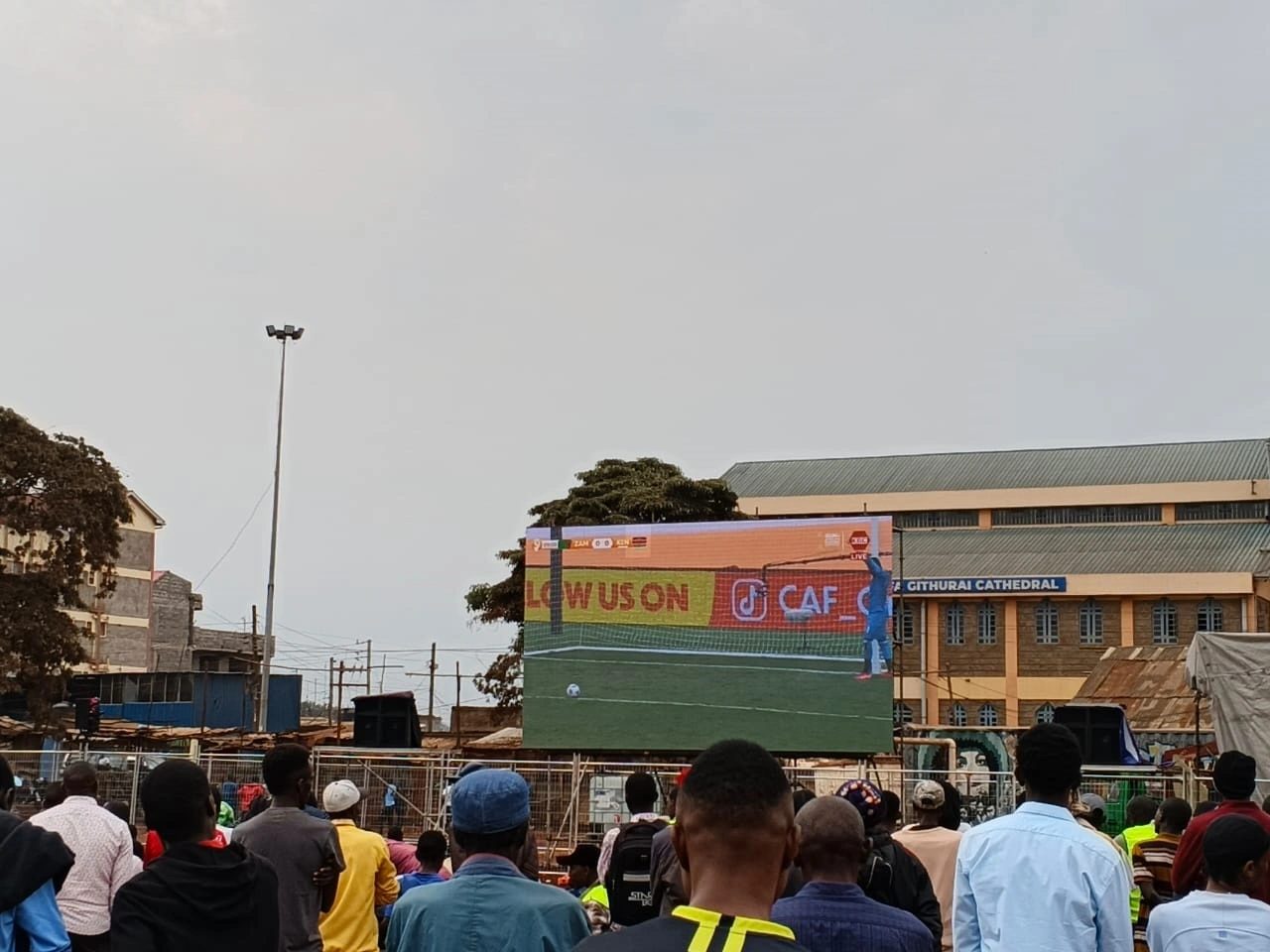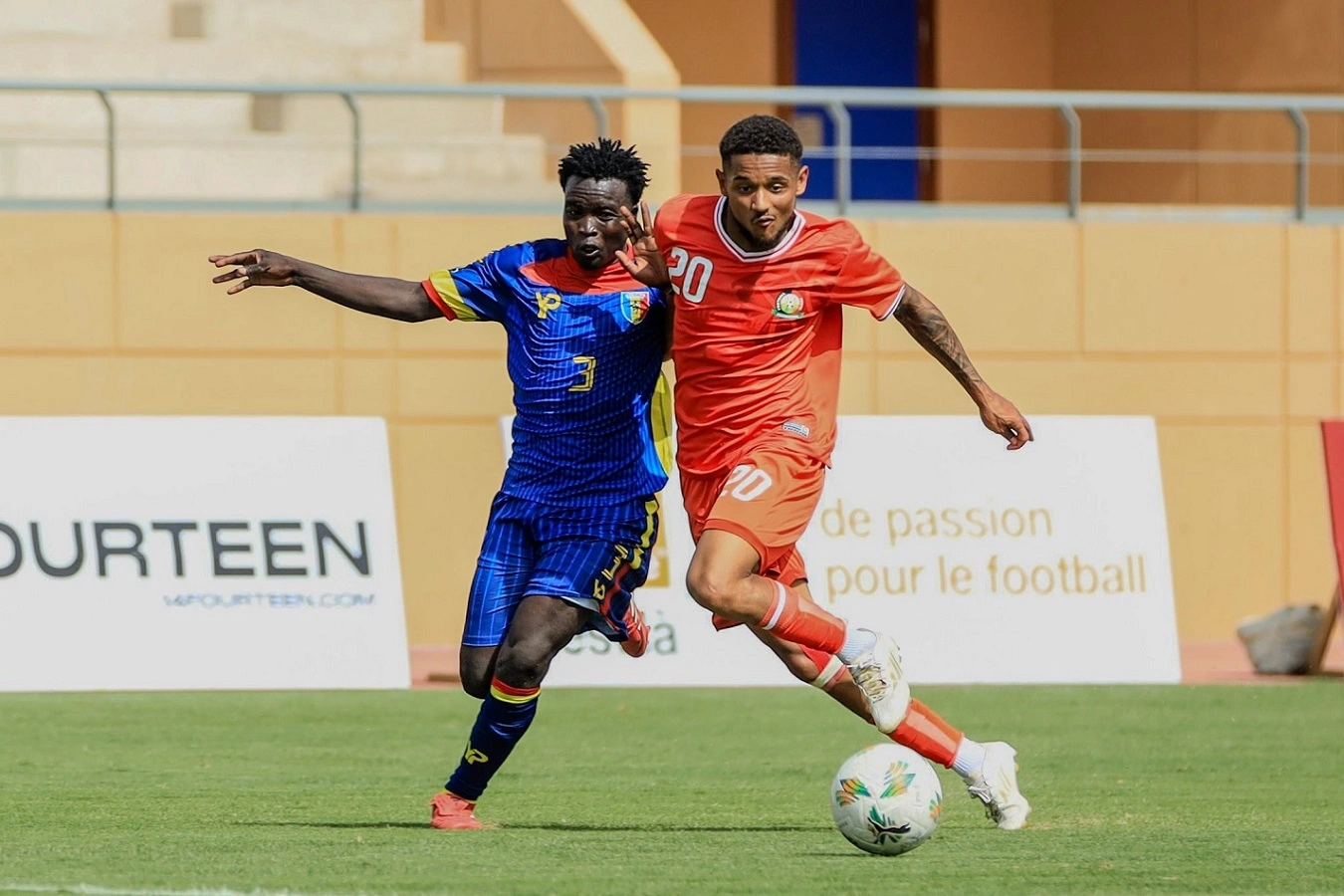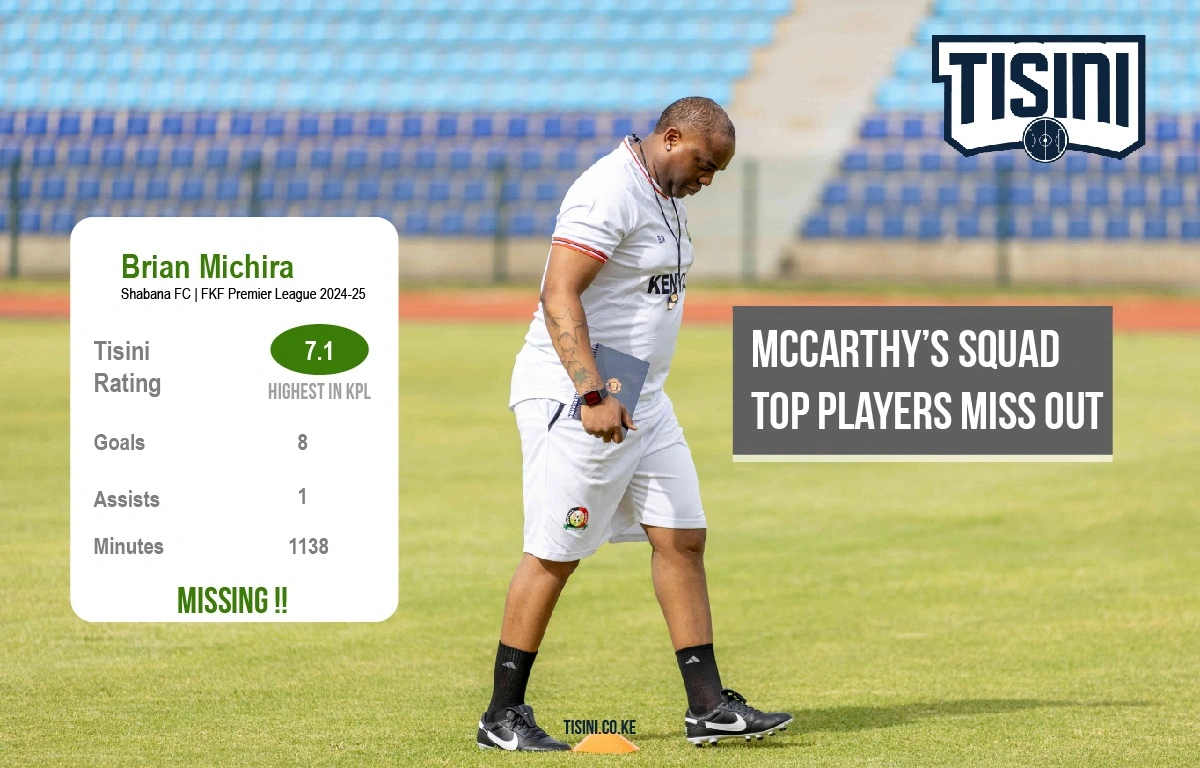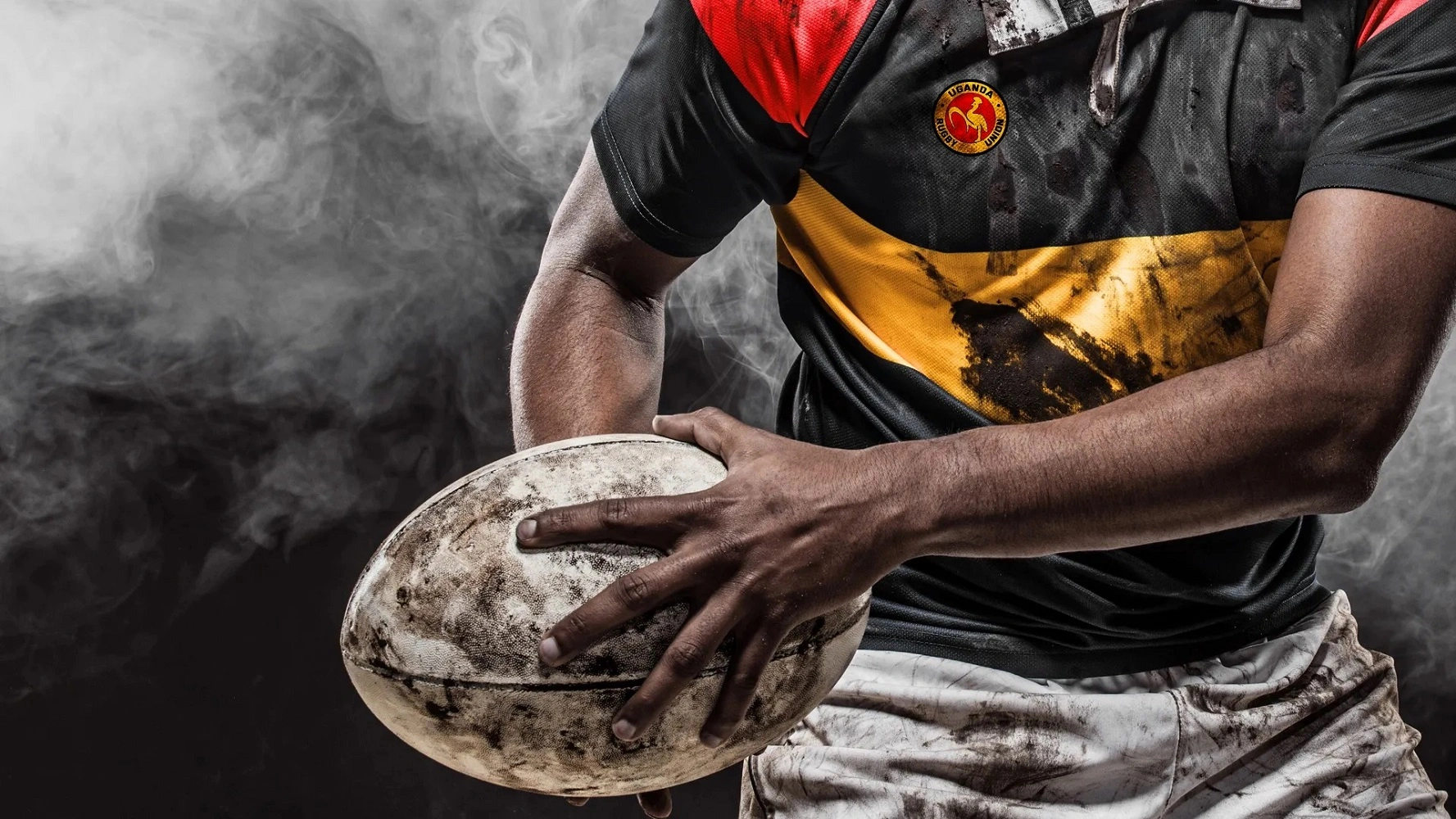
Sibling Rivalry: Is Uganda Rugby Pulling Ahead of Kenya in Tech and Data Adoption?
“I believe there is a hunger for the use of technology and science in sports; it's a new thing to the African market, and their being part of it, coupled with the love for sports and competition, has made more teams look for ways to emerge victorious in the different disciplines.”
These were the words of a local rugby coach and media expert who has worked for a long time in both the Ugandan and Kenyan sports scenes.
Sports in the East African region have come alive in 2025. Tanzania, Uganda and Kenya are currently joint hosts of CHAN. This continental showpiece comes just weeks after Uganda hosted the Rugby Africa Cup 2025.
At the centre of these sporting events is the adoption of technology and the increased use of data. Many fans, for example, have seen Harambee Stars players with GPS vests, wearable devices used in sports to monitor player performance and track various metrics during training and games.
This fact was made more evident with the viral image of Nick Kimanthi, the team manager and lead data analyst for the Harambee Stars.
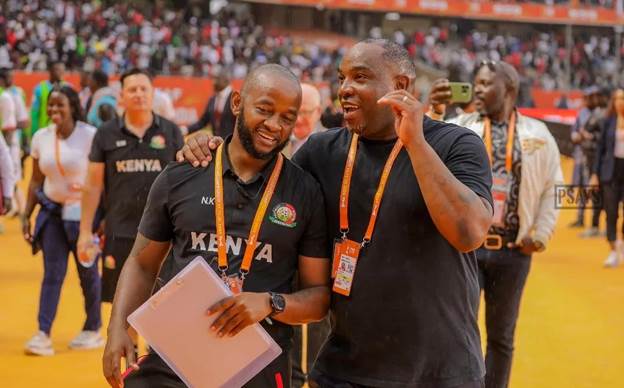
Nick Kimathi (L) with Harambee Stars Head Coach Benni McCarthy after a CHAN match
Why Uganda Leads the Way in Use of Data in Rugby?
Notably, the use of data in sports did not start with CHAN. Tisini Tech has been working with local teams in Kenya and Uganda, primarily in rugby, football, hockey, and basketball.
Rugby has served as a successful entry point for Tisini, with the company achieving great results in this discipline in both Uganda and Kenya.
A good example is the work Tisini did with Daystar Falcons, a university rugby side that gained promotion to the top-tier league, the Kenya Cup.
However, a quick look at the adoption of tech and data in rugby one could claim that Uganda has been better in this regard.
“From what I observed, Ugandans are more willing to invest in their sport and aspire to always improve, as compared to Kenyans. They are willing to invest in something that adds value to their teams and sport in general,” says Kevin Kiprop, the head of rugby at Tisini Tech.
Hippos Fans Club, a Ugandan rugby fan media, supports this take.
According to Hippos, “Ugandan rugby, particularly in recent years, has shown a proactive spirit, especially in partnerships. There’s been a willingness to experiment and create open channels for feedback.”
The openness to experiment with tech and data has borne fruit in the local Ugandan rugby league. Stanbic Black Pirates used Tisini’s data and analytics services during the playoffs of the 2025 Nile Special Premiership.
This strategic analysis allowed them to pinpoint their team's strengths and the opponents' weaknesses in each match, leading to their third title win.
“Pirates used the data first to evaluate their team performance as a team, individual player performance analysis, seeing which players were more impactful, and opposition analysis, knowing the strengths and weaknesses of opposing teams,” Kiprop adds.
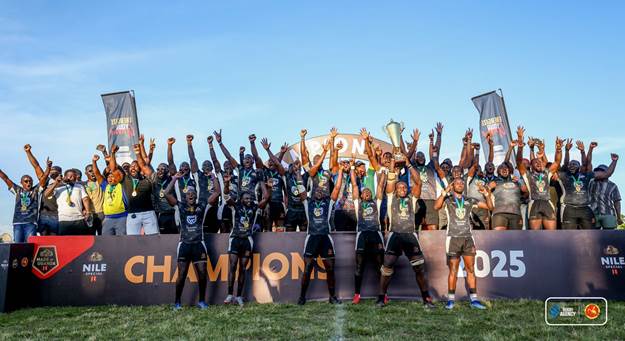
Stanbic Black Pirates lift their trophy.
Another Ugandan team, Kobs, used the data service primarily to evaluate player performances, how each player performs, when their performance dipped, and to select the best squad for their matches.
Uganda Rugby Union Adoption and Inaugural Kampala 7s
What distinguished Uganda from Kenya even more was the official rugby union's (URU) decision to adopt data analytics, specifically by having a national team side work with Tisini.
In June this year, Uganda’s Emerging Cranes etched their name in history books after defeating South Africa’s SA All Stars 17-12 to lift the inaugural Kampala 7s title at Kings Park Arena in Bweyogerere.
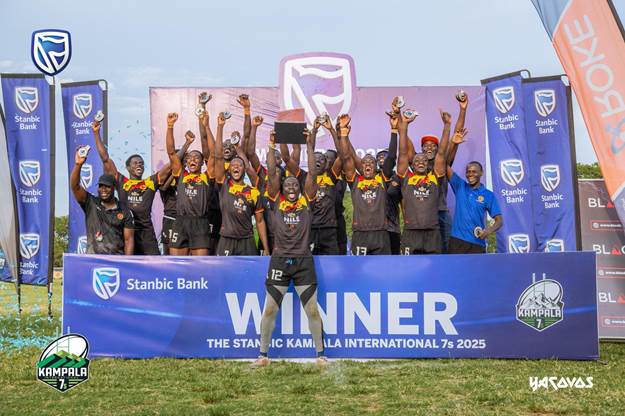
Emerging Cranes Lift the Kampala 7s trophy.
Emerging Cranes used Tisini’s data for post-match team performance analysis after each match and evaluated individual players' strengths and where they needed to improve.
At the sidelines of the event, head coach Tolbert Onyango noted that data was an “eye opener”, allowing him to identify the team’s weaknesses.
He stated, “It’s helped me look at the areas where we were lacking, where we were making mistakes, and where we can be able to improve. So, things like passes, tackles, and all those issues that we had in attack and defence. Very, very enlightening stuff.”
Coach Tolbert also noted the factual nature of data was key in having honest conversations with players.
“We've shared quite a bit of data with the players, and it helps in the discussion so that it's not vindictive, it's not emotional, it's factual.”
Beyond the pitch, the adoption of tech helps in record-keeping for future purposes.
“I would call our tournament directors to onboard Tisini because it really eases everyone's work. Also, the tournament directors, coaches, and the technical teams, because with Tisini, you have all your records properly recorded in a single tap,” stated Kampala7s Tournament Director and Black Pirates Rugby Club TM, Isaac Kimeze.
He adds, “This information will be of great use 10 years from now. You shall know that in the first edition, 120 tries were scored and 120 trees were planted. And all this is possible through Tisini.”
This level of partnership has yet to be achieved for example at the annual Safari 7s in Kenya.
The Rise of Data-Driven Fan Engagement
There is even more value in tech and data adoption for fans. One simplicity is keeping oneself up to date. Rugby events tend to run across a whole day, and sometimes one is not able to be at the grounds for the entire event.
Kimeze was keen to note this advantage: “Tisini brings in the digital part of it. In that, with just the tap of a link, you can know that in the Pirates game, in the ninth minute, Jeremiah Ojampo scored. In the eighth minute, Raymond Okello scored.”
The fun angle is that fans can dig into the data and use it against rivals.
Hippos Media observes that, “Fans, on the other hand, use a lot of this data for banter and making predictions and fan teams of the year.”
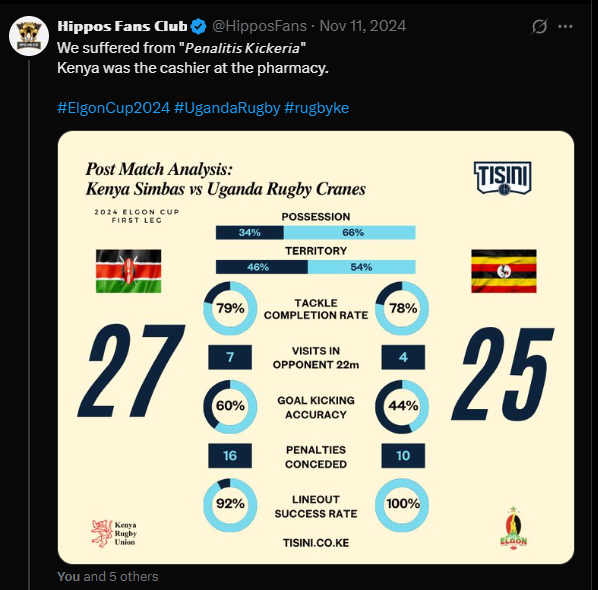
Hippos Fans Club using Tisini’s data on X to banter with Kenya rugby fans
In addition, “The sponsor uses this data to reward MOTM and Player of the Circuit, but also to determine the fan engagement and how it helps brand visibility.”
Fan engagement is enhanced with live feed sharing of in-game stats. This was possible, for example, during the last edition of the Nile Special 7s Series.
Tisini and Kawowo Sports, a digital media company based in Kampala, partnered to make this possible.
For comparison, no media company of Kawowo’s size has done the same in Kenya. Tisini has, however, worked well with Evans Bett TV, an indie media company trying to bring the game closer to fans.
Conclusion
All in all, it’s not that Kenya has completely shunned data in rugby; as noted earlier, the Daystar Falcons were a key success story this year.
In addition, Kenya Harlequins, the organisers of the Christie 7s leg of the national sevens circuit, also partnered with Tisini.
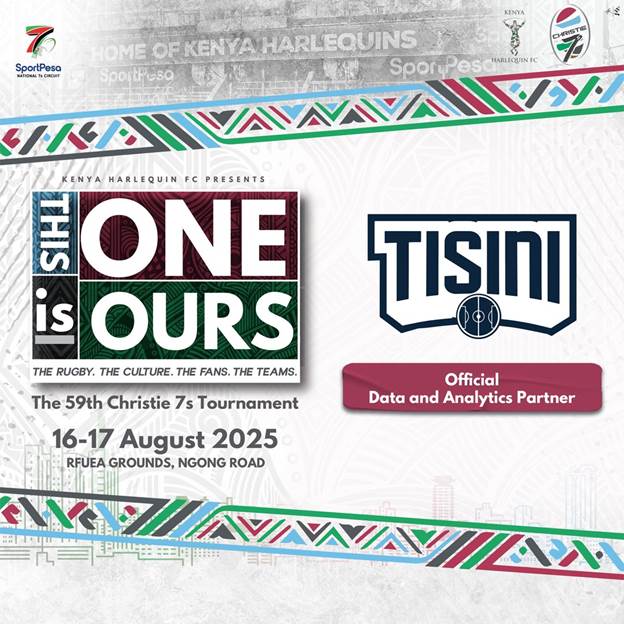
However, Uganda and its teams seemed more receptive. Or perhaps it’s just a sibling rivalry practice to always draw comparisons.
Already, the evolution of sports data has transformed the way sports are played, analysed, and experienced.
As technology companies like Tisini continue to advance, the possibilities for leveraging sports data will only expand, promising an exciting future for athletes, coaches, and fans alike.
With the use of data already here in East Africa, rugby unions need to find the balance between data and intuition.
Like the Pamoja bid for CHAN and AFCON 2027, the rugby unions in the region, given that the sport is largely semi-amateur, may need to coordinate on how they adopt and use data.
Maybe a uniform approach on how the Pamoja countries integrate data in their sports will reduce sibling rivalries and help the region's rugby evolve as technology evolves.
Feature Image Credit: Uganda Rugby Union

